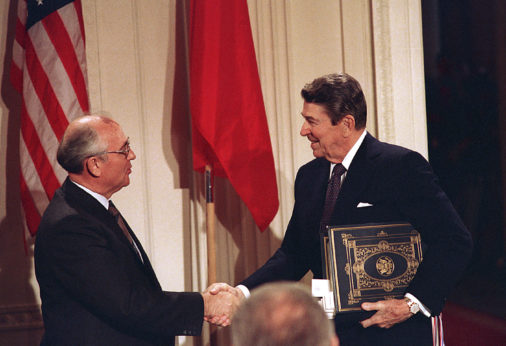
President Donald Trump’s announcement Oct. 20 that the U.S. will pull out of the Intermediate-Range Nuclear Forces (INF) Treaty has drawn swift, negative reactions from arms control and disarmament advocates in this country and expressions of great concern from several European leaders.
The treaty was signed in 1987 by President Ronald Reagan and Soviet leader Mikhail Gorbachev, following a period when the U.S. and Soviet Union were upgrading capacities and expanding deployment of midrange missiles capable of carrying nuclear warheads. The INF bans land-based missiles with ranges between 311 and 3,420 miles but does not cover air- or sea-launched weapons.
After the signing, the two countries destroyed a total of nearly 2,700 missiles. Following the collapse of the Soviet Union in 1991, the ban was expanded to include its successor states.
Though other countries were not party to the treaty, several European countries also destroyed their land-based midrange missiles after it was signed.
The INF is seen as a landmark in the decades of struggle to achieve complete and verifiable nuclear disarmament.
Trump announced the U.S. pull-out after appearing at a campaign rally in Elko, Nevada. He repeated claims made during the Obama administration that Russia is violating the agreement and said the pact is keeping the U.S. from being able to develop new weapons.
“Russia has violated the agreement. They have been violating it for many years,” Trump said as his national security advisor, John Bolton, a well-known hawk, prepared to leave for talks with Russia’s President, Vladimir Putin, and other Russian officials.
“And we are not going to let them violate a nuclear agreement and go out and do weapons and we’re not allowed to,” Trump added. He also noted that China is not included.

In a statement issued Oct. 22, Arms Control Association executive director Daryl Kimball and the ACA’s director for disarmament and threat reduction policy, Kingston Reif, called abandoning the treaty an “unnecessary and self-defeating wrong turn that could lead to an unconstrained and dangerous nuclear arms competition with Russia.”
They warned that ending the agreement, together with the uncertain future of the 2010 New Strategic Arms Reduction Treaty (New START) covering long-range nuclear weapons, is creating “the most serious nuclear arms control crisis in decades. The U.S. and Russia must extend New START in 2021 if the agreement is to continue in effect.
Calling the INF “a cornerstone of the U.S.-Russian nuclear control architecture” vital to European security, the ACA leaders said the INF successfully eliminated an entire class of nuclear weapons deployed in Europe and helped bring an end to the Cold War arms race.
With the U.S. and Russia accusing each other of violations while talks to resolve the conflict have been very limited, they said, “Clearly, neither side has exhausted the diplomatic options that could resolve their concerns.”
Lisbeth Gronlund, co-director of the Union of Concerned Scientists’ Global Security Program, warned in a statement Oct. 22 that withdrawing from the INF “is short-sighted and will ultimately undermine the security of the United States and its allies.”
While signing the treaty “helped ratchet down the U.S.-Soviet arms race and defuse tensions,” she said, withdrawing from it will “open the door to a new and unconstrained competition.” Calling the INF’s limits “very much in the U.S. interest,” she urged the Trump administration to make a serious diplomatic effort to resolve the conflict.
In Europe, while the British government supported the U.S. position, France’s foreign ministry said that country “attributes great importance to conventional and nuclear arms control instruments” and “any hasty unilateral decisions…would be regrettable.”
A spokesperson for Federica Mogherini, the European Union’s top foreign affairs official, issued a statement calling the INF “a pillar of European security architecture” and adding, “The world doesn’t need a new arms race that would benefit no one and on the contrary, would bring even more instability.”
Meanwhile, in Moscow, John Bolton was clearly not heeding the warnings of those opposed to the U.S. pullout, or the urging of the Russians to keep the treaty, saying instead that a formal withdrawal notice “will be filed in due course.”
The Trump administration’s moves should come as no surprise, particularly after the new Nuclear Posture Review that was released earlier this year. That document would reverse the decades of cuts to the U.S. nuclear arsenal under both Republican and Democratic administrations. It calls for development of two new missiles, one of them a so-called “low yield” submarine-launched weapon, while doubling expenditures on nuclear weapons.










